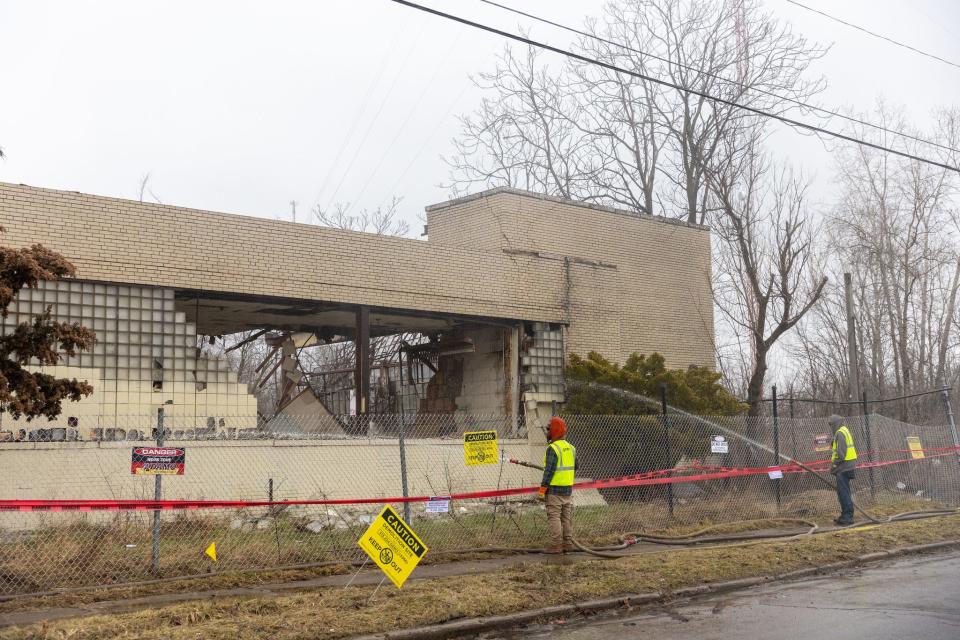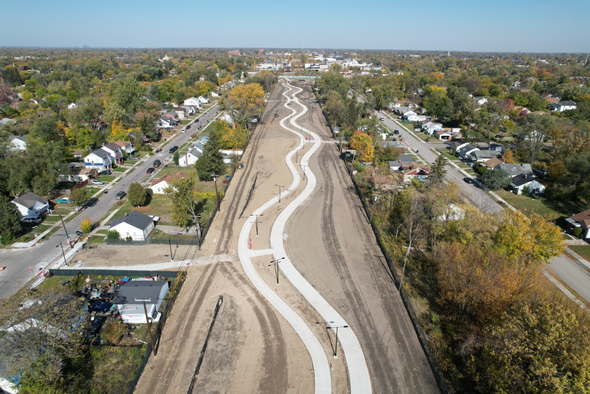Blighted La Choy factory in Detroit, which changed how Americans ate, is coming down
The city of Detroit began demolition of the abandoned La Choy factory, a blighted landmark many didn't know existed, to make way Monday for additional development of the Joe Louis Greenway, a recreational pathway that is aimed at uniting various neighborhoods and expected to be completed in 5-10 years.
The former factory, a 100,000-square-foot structure at 8100 Schoolcraft, was built in the 1930s. It had a significant, but largely forgotten, role in how Detroit influenced what Americans ate, introducing millions of families nationwide to packaged and canned Chinese food.
In addition to opening up the space to recreation, the demolition removes a potential safety hazard.

"It's the latest commercial demo effort in our campaign to aggressively attack all the structures we have identified for demolition," said Detroit's Demolition Director LaJuan Counts, who called the building an eyesore. "We have, currently, 114 properties on our targeted list, but we know there's well over 300 properties we're going to attack."
Over the years, as the La Choy was bought and sold, the factory passed through various hands. During World War II, it was owned by the government to make things for the war effort. And later, more than one company used the space to turn out car parts.
Before being entirely abandoned, the now city-owned property was used as a towing company junkyard.
In 2021, it was put on a list of blighted commercial properties targeted for redevelopment. The city said the demolition is expected to cost about $1.6 million and to unfold over several days this week, and then, it will take a couple more weeks to haul the debris to landfills.
'Helping cooks everywhere'
While many are familiar with La Choy — the brand name that bills itself as a company that "has delivered authentic Asian-inspired ingredients" going back to 1922, and is "helping cooks everywhere prepare quick and delicious meals for their families" — few realize it was founded in Detroit by two University of Michigan students.
Ilhan New, a Korean immigrant, started the company with his college friend Wallace Smith, whom he met while studying at the University of Michigan, according to HistoricDetroit.org, a website that seeks to document the "stories behind the city’s historic places."
New immigrated to Hastings, Nebraska, when he was 9, the website said. But left Nebraska to enroll at the University of Michigan. After college, he worked for Michigan Central Railroad and General Electric in New York and returned to Detroit starting La Choy with Smith, who ran a corner grocery store in Detroit.
Try some Chinese cuisine
The duo, according to HistoricDetroit.org, started La Choy after realizing there was a demand for mung bean sprouts. Fresh sprouts didn't have a long shelf life, but the entrepreneurs realized they could preserve and sell them in glass jars.
The company expanded to offer a variety of Asian foods including noodles, sauces, and specialty vegetables.
At one point, the website said, La Choy was the largest user of Michigan-grown celery in the nation, processing 5,000 tons of it a year. The company also printed recipe pamphlets, which promoted its products, but also urged housewives nationwide to cook Chinese cuisine.
Room for expansion
In 1937, La Choy built a new office and factory at 8100 Schoolcraft Road, the building which is now being demolished.
By then, the La Choy factory was "reputed to be Detroit's leading food industry as far as national distribution is concerned," according to a Detroit News report. The company said it put 8 million copies of its cookbook, "The Art and Secrets of Chinese Cookery," into the hands of Americans eager to try new foods.
New had left the company and sold his shares, HistoricDetroit.org said. New moved back to Korea to start a pharmaceutical company, Yuhan Corp, and Smith was killed in a lightning strike.
The new factory's architect was Giffels & Vallet of Detroit and A.W. Kutsche & Co. of Detroit was the general contractor. The structure was made of steel, concrete, and brick. It had two stories, with room for additional floors in the future if needed.
War halts food production
But instead of expansion, the company's production in Detroit was halted in 1942 as a result of restrictions on tin for metal cans and other goods during the war.
After her husband's death, Smith's widow, Miriam, took over his share of the company, according to HistoricDetroit.org. The Detroit plant was sold to the Department of Defense and relocated its operations to Archbold, Ohio, Miriam Smith's hometown.
Decades of different owners
Amy Elliott Bragg, who wrote about the factory for Crain's Detroit Business, traces the factory's ownership and use over several decades.
For a few years during World War II, Micromatric Hone Corp. ran the plant, and in 1945 bought it.
Meanwhile, the Beatrice Creamery Co., a conglomerate acquired La Choy and other companies and started operating in Detroit — again — but at a different location.
In 1963, Ex-Cell-O, a toolmaker, bought Micromatic. The plant, Bragg wrote, was purchased in the 1970s by the U.S. Fastener Corp., but in 1986, the building was taken over by Gilreath Manufacturing "for custom-injection moldings for auto parts." That company operated out of the building until 1997.
Creating a big greenway
The Joe Louis Greenway is a 27.5-mile path that is expected to connect more than 20 neighborhoods and other trails, such as the Dequindre Cut, and the Detroit Riverfront. It also will help connect Detroit to other cities including Hamtramck, Highland Park, and Dearborn.

"The demolition of this structure is a major step towards the completion of the Joe Louis Greenway," Brad Dick, the city's chief operating officer said. "We are excited to continue this transformational journey not only in this neighborhood, but throughout the rest of the city.”
When finished, the city estimated, the more than 40,000 residents will be a 10-minute walk from the greenway.
Watching it come down
Local residents can watch the demolition, as long as spectators stay behind the roped and taped-off areas. Counts warned that it might not be as exciting to watch as the Pontiac Silverdome implode. Instead of explosives, she said, the city is using an excavator to knock down the factory walls.
"If you've never seen a demo before," she said, "it's interesting to watch huge pieces of equipment take down a building in minutes."

Contact Frank Witsil: 313-222-5022 or fwitsil@freepress.com.
This article originally appeared on Detroit Free Press: Detroit begins demolition on abandoned La Choy factory

